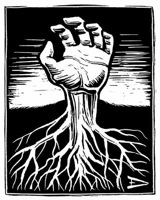Difference between revisions of "Grassroots"
(Created page with 'File:lighterstill.jpgright|frame ==Origin== The earliest origins of the use of "grass roots" as a political metaphor are obscure. In the ...') |
m (Text replacement - "http://" to "https://") |
||
| Line 2: | Line 2: | ||
==Origin== | ==Origin== | ||
| − | The earliest [[origins]] of the use of "grass roots" as a [[political]] [[metaphor]] are obscure. In the United States, an early use of the phrase "grassroots and boots" was thought to have been coined by Senator [ | + | The earliest [[origins]] of the use of "grass roots" as a [[political]] [[metaphor]] are obscure. In the United States, an early use of the phrase "grassroots and boots" was thought to have been coined by Senator [https://en.wikipedia.org/wiki/Albert_J._Beveridge Albert Jeremiah Beveridge] of Indiana, who said of the [https://en.wikipedia.org/wiki/Progressive_Party_(United_States,_1912) Progressive Party] in 1912, "This party has come from the grass roots. It has grown from the [[soil]] of people's hard [[necessities]]." In a 1907 newspaper article about Ed Perry, vice-chairman of the Oklahoma state committee, the phrase was used as follows: "In regard to his political views Mr. Perry has issued the following terse [[platform]]: 'I am for a square deal, grass root [[representation]], for keeping close to the people, against ring rule and for fair treatment.'" A 1903 news article on a campaign for possible [https://en.wikipedia.org/wiki/Theodore_Roosevelt Theodore Roosevelt] running mate Eli Torrance quotes a Kansas political organizer as saying: "Roosevelt and Torrance clubs will be [[organized]] in every locality. We will begin at the grass roots." |
| − | *[ | + | *[https://en.wikipedia.org/wiki/20th_century 1907] |
==Definitions== | ==Definitions== | ||
*1: basic, [[fundamental]] <the grassroots [[factor]] in deciding to buy a house> | *1: basic, [[fundamental]] <the grassroots [[factor]] in deciding to buy a house> | ||
| Line 9: | Line 9: | ||
*3: not [[adapted]] from or added to an existing facility or operation : totally new <a grassroots refinery> | *3: not [[adapted]] from or added to an existing facility or operation : totally new <a grassroots refinery> | ||
==Description== | ==Description== | ||
| − | A '''grassroots''' [[movement]] (often referenced in the [[context]] of a [[political]] movement) is one driven by the [[politics]] of a [[community]]. The term implies that the [[creation]] of the movement and the group supporting it are [[natural]] and [[spontaneous]], highlighting the [[differences]] between this and a movement that is orchestrated by [[traditional]] [[power]] structures. Grassroots movements are often at the local level, as many [[volunteers]] in the community give their time to [[support]] the local party, which can lead to helping the national party. For instance, a grassroots movement can lead to significant [ | + | A '''grassroots''' [[movement]] (often referenced in the [[context]] of a [[political]] movement) is one driven by the [[politics]] of a [[community]]. The term implies that the [[creation]] of the movement and the group supporting it are [[natural]] and [[spontaneous]], highlighting the [[differences]] between this and a movement that is orchestrated by [[traditional]] [[power]] structures. Grassroots movements are often at the local level, as many [[volunteers]] in the community give their time to [[support]] the local party, which can lead to helping the national party. For instance, a grassroots movement can lead to significant [https://en.wikipedia.org/wiki/Voter_registration voter registration] for a political party, which in turn helps the state and national parties.[https://en.wikipedia.org/wiki/Grassroots] |
[[Category: Political Science]] | [[Category: Political Science]] | ||
Latest revision as of 01:03, 13 December 2020
Origin
The earliest origins of the use of "grass roots" as a political metaphor are obscure. In the United States, an early use of the phrase "grassroots and boots" was thought to have been coined by Senator Albert Jeremiah Beveridge of Indiana, who said of the Progressive Party in 1912, "This party has come from the grass roots. It has grown from the soil of people's hard necessities." In a 1907 newspaper article about Ed Perry, vice-chairman of the Oklahoma state committee, the phrase was used as follows: "In regard to his political views Mr. Perry has issued the following terse platform: 'I am for a square deal, grass root representation, for keeping close to the people, against ring rule and for fair treatment.'" A 1903 news article on a campaign for possible Theodore Roosevelt running mate Eli Torrance quotes a Kansas political organizer as saying: "Roosevelt and Torrance clubs will be organized in every locality. We will begin at the grass roots."
Definitions
- 1: basic, fundamental <the grassroots factor in deciding to buy a house>
- 2: being, originating, or operating in or at the grass roots <a grassroots organization> <grassroots political support>
- 3: not adapted from or added to an existing facility or operation : totally new <a grassroots refinery>
Description
A grassroots movement (often referenced in the context of a political movement) is one driven by the politics of a community. The term implies that the creation of the movement and the group supporting it are natural and spontaneous, highlighting the differences between this and a movement that is orchestrated by traditional power structures. Grassroots movements are often at the local level, as many volunteers in the community give their time to support the local party, which can lead to helping the national party. For instance, a grassroots movement can lead to significant voter registration for a political party, which in turn helps the state and national parties.[1]
